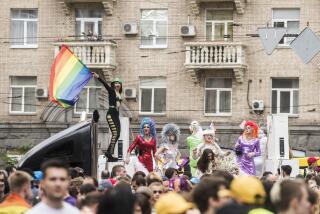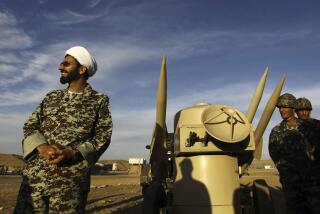U.N. Joins in Criticizing Travel Ban on Chechens
- Share via
ASSINOVSKAYA, Russia — Chechen civilians who have been stuck at border checkpoints for days won the backing of the United Nations on Friday in protesting Russia’s policy of restricting the movement of Chechen males ages 10 to 60.
Russian officials pledged to modify the travel ban, and some men of fighting age from Chechnya reportedly were allowed to cross from the war-torn separatist republic into the neighboring republic of Ingushetia on Friday. But there were conflicting reports about whether the border had actually been reopened.
The Russian television network NTV reported that the military will continue to prohibit all Chechen males between the ages of 15 and 60 from entering or leaving the republic. And Ingushetia’s president, Ruslan S. Aushev, accused the federal government of not lifting the restrictions at all.
“Where can peaceful people go?” asked Anzor Temirbulatov, 45, a Chechen refugee from the village of Yermolovka who was stranded at the Assinovskaya border crossing. “We can’t even leave Chechnya--so what are we supposed to do? Either die under Russian bombs or starve to death at the checkpoint. There are no other options.”
After Russian generals were surprised last weekend by strong assaults on three towns they had claimed were securely under Russian control, the federal government cracked down on the movement of Chechen males who it maintained could have participated in the attacks.
All Chechen males from 10 to 60 were barred from crossing the border with the rest of Russia, meaning that families seeking refuge in Ingushetia were forced to either separate or remain in Chechnya.
The indiscriminate nature of the travel ban drew strong protests from New York-based Human Rights Watch and other human rights activists. On Friday, the Office of the U.N. High Commissioner for Refugees urged Russia to open the border to all refugees.
“[The] UNHCR is very concerned,” spokesman Ron Redmond told reporters in Geneva. “All those fleeing the war in Chechnya are in need of international protection regardless of their gender and age.”
After the rebel raids on the towns of Gudermes, Argun and Shali last weekend, the flow of refugees seeking to escape the fighting skyrocketed. Cars and trucks formed lines that were miles long as the refugees waited to cross.
“We can’t go back to our towns because we are scared that we will be killed in the fighting,” said Salman Guzuyev, 63, a refugee from Shali. “But we are not allowed to leave Chechnya either. We are simply stuck in the middle of nowhere and have to wait until we die or freeze to death.
“What do 10-year-old boys have to do with terrorism? They are not men enough yet to ring a hen’s neck, to say nothing about killing a human being. They will not have the guts to pull the trigger. Why are they suspected of being terrorists?”
Some Chechens even had difficulty getting to the border. In the village of Dyuba-Yurt, the locals were first told to pack and leave because the town was about to be bombed by Russian troops. But once they were ready, troops stationed around the town’s perimeter wouldn’t let them out.
Ingushetia’s Aushev, whose republic is sheltering about 175,000 Chechen refugees, said the ban on movement by males was pushing refugees to side with the rebels.
“Allegations have spread that this [the border restriction] has been done to annihilate all Chechen males,” Aushev told Russia’s Interfax news agency. “For this reason, many people are saying it is better to go to the mountains and save their lives.”
Russian Emergencies Minister Sergei K. Shoigu, who was recently given the additional post of deputy prime minister, indicated that the government will revise its policy.
“It is incorrect to say that the decision will remain the way it is now,” he told reporters. “Anyway, we will take a sufficiently well-thought-out and proper approach to this issue.”
Russian Col. Gen. Valery L. Manilov, first deputy chief of staff, said the travel ban will be lifted once federal troops regain full control of the part of Chechnya they occupy.
Times special correspondent Nunayev reported from Assinovskaya and staff writer Paddock from Moscow.
More to Read
Sign up for Essential California
The most important California stories and recommendations in your inbox every morning.
You may occasionally receive promotional content from the Los Angeles Times.













